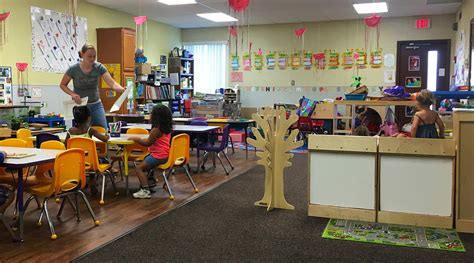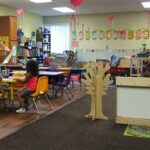As a parent, choosing the right daycare for your little one is a significant decision. At Little People Day Care, we understand the importance of early childhood education and the impact it has on a child’s development. Our focus is on creating a safe, nurturing environment where children can thrive and grow. We believe in providing age-appropriate learning and play activities that support each child’s individual development. In addition to cognitive development through creative play, we also prioritize fostering social and emotional growth, and promoting language and communication skills. Our goal is to help children build healthy habits and self-care skills that will benefit them for a lifetime. In this blog post, we will explore the various aspects of our approach to early childhood education, and how it sets the foundation for a successful future for our little ones.
Importance of Early Childhood Education
Early childhood education plays a crucial role in the development of young children. It lays the foundation for their future academic success, social skills, and emotional well-being. Research has shown that children who receive high-quality early childhood education are more likely to graduate from high school, attend college, and have successful careers. This early exposure to learning also helps children develop essential communication and cognitive skills that are necessary for their overall growth and development.
Moreover, early childhood education provides a safe and nurturing environment for children to explore and learn through play. It helps them build confidence, independence, and resilience as they navigate various challenges and experiences. By fostering a love for learning at a young age, early childhood education sets the stage for a lifetime of curiosity, creativity, and critical thinking.
Additionally, early childhood education promotes the development of important social and emotional skills. It teaches children how to interact with others, express their emotions, and cultivate empathy and compassion. These skills are essential for building strong relationships, understanding different perspectives, and navigating the complexities of the social world.
Overall, the importance of early childhood education cannot be overstated. It is the cornerstone of a child’s development and sets the stage for their lifelong learning journey.
Creating a Safe and Nurturing Environment
Creating a safe and nurturing environment for children is essential for their overall development. Safety is of utmost importance in any environment where children spend their time. This includes ensuring that the physical space is free from hazards, such as sharp objects, small items that can be swallowed, and secure furniture to prevent tipping over. Additionally, it is important to provide emotional and psychological safety by fostering a culture of respect, kindness, and understanding.
Another crucial aspect of creating a nurturing environment is nurturing positive relationships. Children thrive when they feel loved, supported, and valued. This can be achieved by fostering strong connections with both caregivers and peers, and by providing opportunities for open communication and emotional expression.
Furthermore, a nurturing environment includes opportunities for growth and development. This can be facilitated by providing stimulating activities, promoting autonomy and independence, and encouraging a growth mindset. Children should feel empowered to explore, create, and learn in a space that is conducive to their overall well-being.
Overall, creating a safe and nurturing environment is essential for the healthy development of children. By prioritizing safety, nurturing positive relationships, and fostering growth and development, caregivers can create an environment where children can thrive and reach their full potential.
Age-Appropriate Learning and Play Activities
When it comes to childhood development, providing age-appropriate learning and play activities is crucial for nurturing growth and understanding. These activities should be tailored to the child’s current developmental stage, ensuring that they are both challenging and enjoyable.
By engaging in age-appropriate learning and play activities, children are able to explore and understand the world around them in a way that is suitable for their age and cognitive abilities.
These activities can include simple puzzles, building blocks, coloring, and imaginative play, all of which contribute to the child’s development of problem-solving skills, creativity, and fine motor skills.
It is important for parents and caregivers to be aware of the child’s developmental milestones and provide activities that align with their current abilities, fostering a positive and supportive learning environment.
Fostering Social and Emotional Development
When it comes to fostering social and emotional development in young children, it’s important to create a supportive and empathetic environment. This can be achieved by encouraging positive interactions and communication between children and adults, as well as among peers. By providing opportunities for children to engage in cooperative play and group activities, they are able to develop important social skills such as sharing, taking turns, and problem-solving.
Another key aspect of fostering social and emotional development is teaching children how to recognize and manage their emotions. This can be done through activities that help children identify and express their feelings, as well as through modeling appropriate emotional responses. By providing a safe space for children to express themselves and receive support, they are better equipped to navigate their emotions in a healthy way.
In addition to creating a nurturing environment for social and emotional development, it’s important to provide opportunities for children to develop empathy and understanding for others. This can be achieved through activities that promote kindness, compassion, and inclusion. By incorporating lessons on diversity and cultural awareness, children are able to develop a greater sense of empathy and appreciation for others’ perspectives and experiences.
Overall, fostering social and emotional development in young children is crucial for their overall well-being and future success. By creating a supportive and empathetic environment, teaching children how to manage their emotions, and promoting empathy and understanding, we can help children build strong social and emotional skills that will benefit them throughout their lives.
Promoting Cognitive Development through Creative Play
Promoting Cognitive Development through Creative Play
Engaging in creative play activities is an essential element in promoting cognitive development in young children. Through imaginative and open-ended activities, children are able to exercise their cognitive skills such as problem-solving, decision-making, and critical thinking. Creative play allows children to explore and experiment with various materials, shapes, and colors, which in turn stimulates their brain development.
Moreover, creative play encourages children to use their imagination and creativity to come up with new ideas and solutions, which are important skills for cognitive development. By allowing children to engage in activities such as drawing, painting, building with blocks, and role-playing, they are able to develop their cognitive abilities in a fun and enjoyable way.
Additionally, creative play also enhances children’s memory and attention span, as they often have to recall information, follow instructions, and concentrate on the task at hand. These cognitive skills are crucial for their overall development and readiness for formal learning environments. By promoting cognitive development through creative play, children are able to explore and expand their mental capabilities in a positive and nurturing way.
In conclusion, it is important to recognize the value of creative play in promoting cognitive development in young children. By providing opportunities for children to engage in imaginative and open-ended activities, we are fostering their cognitive skills and preparing them for future academic success. Creative play is not only fun, but also essential for children’s cognitive growth and overall development.
Developing Language and Communication Skills
Developing language and communication skills in young children is crucial for their overall development. Language skills are the foundation for all areas of learning, as children use language to express their needs, thoughts, and emotions. Effective communication is essential for success in school, relationships, and eventually in the workplace.
One of the best ways to help children develop their language and communication skills is through interactive play and activities. This can include games that encourage conversation, storytelling, and role-playing. Through these activities, children learn how to express themselves, listen to others, and communicate their ideas effectively.
Another important aspect of developing language and communication skills is to encourage reading and storytelling. Reading aloud to children from a young age helps them develop vocabulary, language structure, and comprehension skills. Additionally, encouraging children to tell their own stories or write in a journal helps them practice organizing their thoughts and expressing themselves in written form.
Lastly, modeling good communication is crucial for children to learn effective language and communication skills. By speaking clearly, listening attentively, and engaging in meaningful conversations with children, adults provide them with the best examples of how to communicate effectively.
Building Healthy Habits and Self-Care Skills
Building healthy habits and self-care skills in early childhood is essential for setting the foundation for a lifetime of well-being. It is important to teach young children the importance of taking care of themselves physically, emotionally, and mentally.
By modeling and promoting healthy habits such as regular exercise, proper nutrition, and good hygiene, children can develop a positive attitude towards self-care. Encouraging children to engage in physical activities and making healthy food choices can help them establish lifelong habits that promote overall wellness.
In addition to physical health, it is crucial to emphasize the importance of mental and emotional well-being. Teaching strategies such as mindfulness, relaxation techniques, and expressing emotions in a healthy manner can aid in the development of self-care skills. By providing a nurturing and supportive environment, children can learn to manage stress and build resilience.
Furthermore, instilling healthy habits and self-care skills at a young age can contribute to the prevention of various health issues later in life. Teaching children the significance of getting enough sleep, practicing good dental hygiene, and taking care of their mental health can have long-term benefits. By prioritizing self-care, children are better equipped to lead healthy and fulfilling lives.







